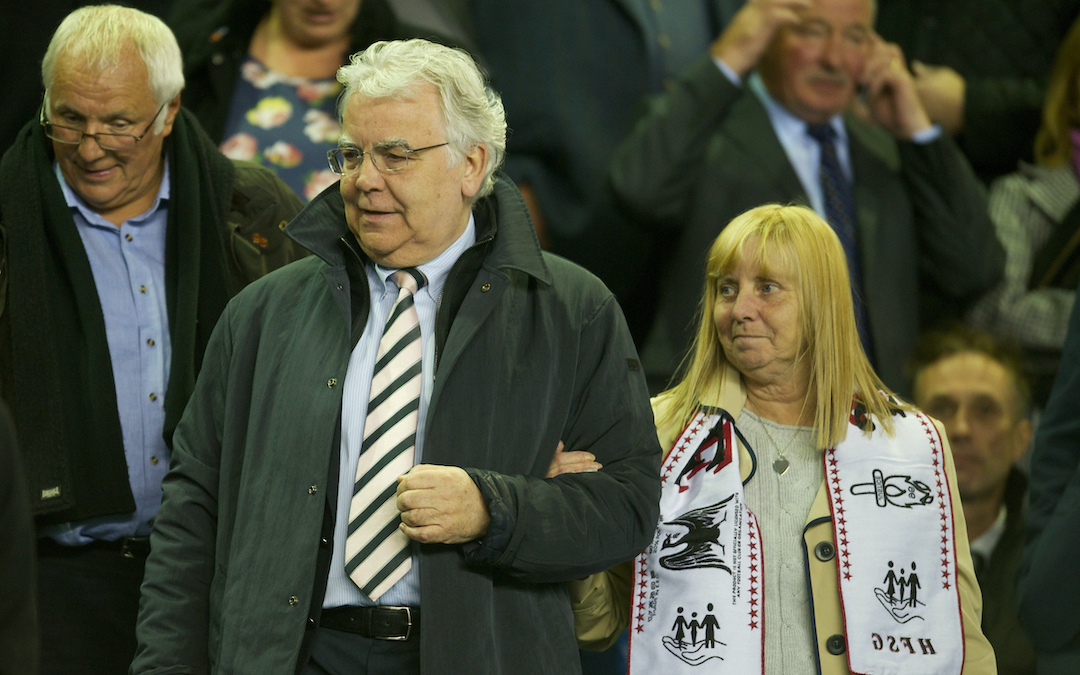“What will never be in doubt about Bill Kenwright is that he was a club man, a city man.” – A tribute to Everton’s late chairman…
ON April 15, 2013, Bill Kenwright stood in front of The Kop.
His voice trembling. His awe and respect patently obvious. His empathy and authenticity not in doubt.
On Thursday night, that same stand showed the same organic sense of regard to the man at the heart of Everton Football Club for most of our adolescent and adult lives.
We can disengage with chairpersons, CEO’s and board members of respective clubs, not least our own. We can see them as mere facilitators to enjoying our team. When it’s bad, we see them as something much more sinister.
What will never be in doubt about Kenwright is that he was a club man, a city man. On that podium he talked about watching both Liverpool and Everton in his youth. He talked about the love he had for his family who loved Liverpool Football Club. He talked about where he was on the day of Hillsborough.
He and Everton shared trauma because they were part of this city. They were made to question their own sense of place and mortality by being drawn to play in Birmingham and not Sheffield. He got to feel every sinew of what loss meant to everyone, not least as he referenced, Scouse mothers.
Liverpool’s prevailing rivalry with Everton provided enough of its own pantomime moments. It has become an amusing, at times very toxic sub-culture of city life. Kenwright stands for something more positive within the rivalry. Not the idea of Reds and Blues going across the park every other Saturday.
That ideology is rightly where it should be, none more so because ticket demand and financial strain means he came of age in a much simpler time. He is a semblance of an underlying respect. Of understanding a place and its people. Of being generally well valued in an environment riddled with boardroom pariahs and parasites.
Premier League football ownership and senior leadership is an exercise in soft power which projects downwards on supporters. It isn’t for me to tell Evertonians what type of ownership they should aspire to. But whatever comes next, someone who cares as much as Kenwright will be almost impossible to replicate.
That isn’t to say this can’t be achieved by anyone other than those with a lived experience of when the ‘Merseyside’ chant erupted around Wembley Stadium.
Like Kenwright, John Henry and Fenway Sports Group have made errors of judgement, but the idea they are generally well-intentioned stewards of the enterprise remains a strong one among many. These people can come from anywhere in the world. They can be from an oil state or an investment bank. It’s about integrity as much as intention.
Premier League football remains an odd space, mortgaged up to the eyeballs and living royalty to royalty. It exists outside conversations about the management of public services now privatised and seeping shit into the waters.
Liverpool and Everton demand competitive football teams. They demand their status is upheld on the pitch and off. Many now attribute such competition solely to transfer net spend.
Kenwright’s legacy becomes part of the tectonic plates slowly shifting across football and changing the landscape and demands with them.
At the closing of his speech at the 2013 memorial service, Kenwright opened an invitation to remember the 97 across the park as beautifully and casually as inviting a neighbour for a cup of tea.
He wasn’t reading from an autocue – he was saying something he genuinely felt and believed, that Liverpool Football Club was his neighbour, and this was a community which needed to look after each other.
Ultimately, he should be remembered by everyone as a man who loved a club and city and who was proud in whatever aspect to represent it. He remains part of a minority and, in truth, a dying breed.
He will be honoured at Goodison Park. He was honoured in Anfield.
He wouldn’t have wanted it any other way.












A cracking piece Dan, summed the man up perfectly as well as his relationship to the city.
everything in the article is so trie. men like bill are rare, when it comes to his beloved city all rivalries are put aside. diring the hillsborough disaster and the years following, he was imense in his support cor the families and club. some wonderfull gestures on behalf of himself and the club he loved with all his heart
. everton and their fans should be proud and forever gratefull for everything he did for his club, and his city. i for one an proud of a loyal evertonion and a magnificent scouser. rest in peace bill, ypu deserve your rest
your me.ory will live long in the hearts of so many, no matter who they support.
deepest sympathy to his wife and loved ones at this sad time.
a red.
I admire mr Kenwright I recognize the feeling I am from that same era long ago when we would go with my dad anfield one Saturday and Goodison the next . We are all scousers and feel the same way blue or red . Godbless and rest in peace.
He was old school, we won’t see his kind again.
Top fella.